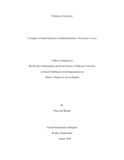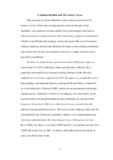Please use this identifier to cite or link to this item:
https://elibrary.tucl.edu.np/handle/123456789/720Full metadata record
| DC Field | Value | Language |
|---|---|---|
| dc.contributor.author | Kharel, Netra Lal | - |
| dc.date.accessioned | 2021-07-11T05:26:02Z | - |
| dc.date.available | 2021-07-11T05:26:02Z | - |
| dc.date.issued | 2010-08 | - |
| dc.identifier.uri | http://elibrary.tucl.edu.np/handle/123456789/720 | - |
| dc.description.abstract | This research on Salman Rushdie's novel The Satanic Verses (1988) aims at analyzing the novel in the light of the pluralistic, non-totalized and open-ended form of postmodern discourse to make the point that a single discourse about the history, religion and nationality of India is insufficient. Effects of imperialism, the mythologized past of Islam, and interrogation of the unitary discourse of the Indian society are some of the dominant issues in the novel. By bringing various discourses such as historical, political, religious and national, Rushdie privileges a non-totalized, pluralistic, open- ended form of discourse theory asserting that a single discourse about any truth is insufficient. Rushdie develops a postmodern discourse about India in the form of postmodern critique of grand narratives. | en_US |
| dc.language.iso | en_US | en_US |
| dc.publisher | Central Department of English | en_US |
| dc.subject | pluralistic | en_US |
| dc.subject | non-totalized | en_US |
| dc.subject | English Novel | en_US |
| dc.subject | postmodern discourse | en_US |
| dc.title | A Critique of Grand Narrative in Salman Rushdie’s The Satanic Verses | en_US |
| dc.type | Thesis | en_US |
| local.institute.title | Central Department of English | en_US |
| local.academic.level | Masters | en_US |
| Appears in Collections: | English | |
Files in This Item:
| File | Description | Size | Format | |
|---|---|---|---|---|
| cover.pdf | 12.8 kB | Adobe PDF |  View/Open | |
| chapter.pdf | 171.82 kB | Adobe PDF |  View/Open |
Items in DSpace are protected by copyright, with all rights reserved, unless otherwise indicated.
